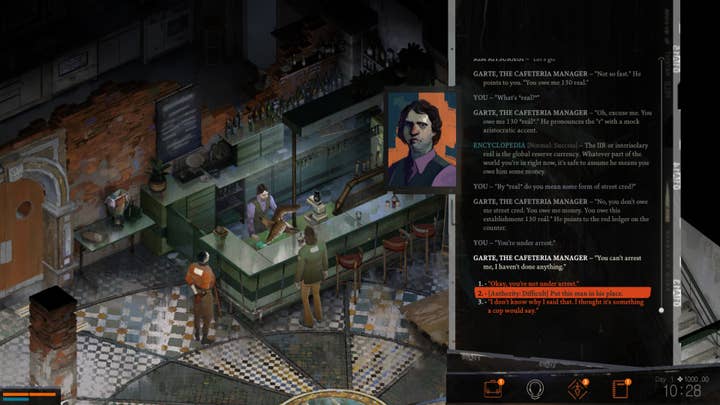Chasing oblivion with Disco Elysium and alcohol addiction
'Really, at the bottom of their soul, people know that they have a bit of a drinking problem,' says designer and writer Robert Kurvitz
Video games don't have a good relationship with alcohol. Although a common feature in RPGs, the ability to quaff back booze generally amounts to little more than a mildly amusing distraction that grows old long before the inverted controls return to normal and the blurred vision clears.
While games may have matured in recent years, the medium still treats alcohol consumption with the same reckless abandon as a 16-year-old drinking their first Blue WKD at an abandoned bus stop; it's fleeting, novel, and usually ends in being sick.
Outside of that, the trope of a hard-boiled alcoholic is often used as narrative shorthand to paint a character as "troubled", but it rarely dives any deeper into the pain that drives someone to drink -- or how it really affects them -- other than oddly glamorized portrayals of the humorous cynics or former soldier who has "seen some shit".
Worse still is when alcoholism in games is played for laughs, such as the irredeemable drunk that populates every street corner in every fantasy RPG.
Games like That Dragon Cancer, What Remains of Edith Finch, and Night in the Woods have shown the industry is not only well-equipped to explore difficult issues, but able to approach them in an entirely unique way. As of yet, no game has really tapped into the oblivion-seeking tendencies that come with alcohol addiction -- how it wills you to chase that tiny black dot in the distance and makes you completely unable to stop.

Detective RPG Disco Elysium, from Estonian developer ZA/UM, seeks to dive headfirst into that experience and, much like the blackly comic Netflix original series BoJack Horseman, illustrate the comedy and tragedy inherent therein.
"Really, at the bottom of their soul, people know that they have a bit of a drinking problem," lead designer and writer Robert Kurvitz tells GamesIndustry.biz. "I mean if you're drinking something every week, and just can't connect to your friends without it, maybe it is a bit problematic.
"Maybe it's not only the guy on the street who's just absolutely succumb to the worst genetic ravages of alcoholism, maybe us as a society also have a bit of a dependency on spicing things up with this fungus that has colonised us...
"Seriously I think it's a very very serious issue; it's more serious than people think it is... It's an immensely important issue for human society in general, and even politically to ask ourselves: 'Can we build a reality and then face it without bludgeoning ourselves to death by sucking on alcohol every day? Can I be friends with people and just meet them? Can man come up with a way of reproducing and meeting a mate that doesn't [involve] eight litres of wine on the table?' These are challenges that are yet to be matched and I'm interested to see where it's going."
"Maybe it's not only the guy on the street who's just absolutely succumb to the worst genetic ravages of alcoholism, maybe us as a society also have a bit of a dependency"
Kurvitz, who has quit drinking since he began developing Disco Elysium four years ago, has never actually made a video game before. In fact, almost no one on his team has ever worked on a game. Kurtviz is an author and writer first and foremost, and his background in storytelling and games comes from years of playing tabletop RPGs like Dungeons & Dragons. But games, he suggests, are much like books in that they are perfectly positioned to show the audience what's going on inside a character's head. It's a concept that the developers have even turned into a mechanic.
"If you just put a couple of designers and programmers, as well as an artist in a room, and let them dream up concepts of what you can do with games, it's insane," says Kurvitz. "You can do so many things, and a whole lot of them are firsts. We have an inventory for thoughts, which I realised that no one has tried yet, but it was a very logical idea to come to. You can't always be scrounging up loot from the floor, because you just have to kill people, and that takes you on a certain kind of story.

"So in our world, you also have loot, such as good thoughts that you get from a situation... To make a game that isn't entirely about killing people and taking their guns and swords, you need to have a [different] way to reward the player."
The thoughts inventory accompanies this exploration of alcoholism as you collect different thoughts by playing the game. From those black thoughts that creep in at the worst possible times to thoughts of fear or love, access to a character's psyche in this manner facilitates an exploration that can, at times, strike worryingly close to home.
Rather than leaning on tired old tropes of dead wives and missing children, Kurvitz says he wants to tackle "whatever the opposite of outlandish is". He concedes that tragedies like these are no less painful for the people who live through them, but are far from a universal experience.
"Can man come up with a way of reproducing and meeting a mate that doesn't [involve] eight litres of wine on the table? These are challenges that are yet to be matched"
"The actual ravages that [people] meet are economic, personnel," says Kurvitz. "The wearing away of dreams, slowing succumbing to alcoholism and mostly just heartbreak and disappointment in human beings...
"It's also quite possible to be mourning the passing of someone who is still living, which is what literally every one of us has [done] at some point in life. Some things end and we just don't want them to. But people make decisions, they leave each other's side. Friends will leave you, lovers will leave you -- they won't die and leave behind the video tape produced by Dead Wife Pictures Presents, running around the building with French curtains. They leave behind a giant fucking mess of shit in your head, an e-mail correspondence you never want to look at again, and just diminished faith in humanity."
Throughout our interview, Kurvitz is quick to make jokes and see the bleak, comic side of things; he argues that it's impossible not to tinge tragedy with comedy.
"If you really, really face down the situation, if you really get to the dark of it, it always produces a hollow laughter," he says. "I think truth sounds like some kind of hollow laughter... What I think I'm saying is humor doesn't lighten things in life. Maybe it makes them even darker. Maybe it's not your friend."
With only a demo of Disco Elysium available, it's too early to tell how well Kurvitz and ZA/UM have tackled the grim realities of alcoholism, but the attempt to pry open the mind of an alcoholic and play it as something other than a punchline is further evidence of an industry that is continually trying to grow.
